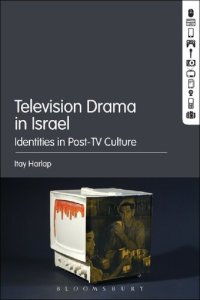
Ebook: Television Drama in Israel: Identities in Post-TV Culture
Author: Itay Harlap
- Year: 2017
- Publisher: Bloomsbury Academic
- Language: English
- pdf
Israeli television, currently celebrating fifty years of broadcasting, has become one of the most important content sources on the international TV drama market, when serials such as Homeland, Hostages, Fauda, Zaguory Empire and In Treatment were bought by international networks, HBO included. Offering both a textual reading and discourse analysis of contemporary Israeli television dramas, Itay Harlap adopts a case study approach in order to address production, reception and technological developments in its accounts. His premise is that the meeting point between social trends within Israeli society (primarily the rise of opposition groups to the hegemony of the Zionist-Jewish-masculine-Ashkenazi ideologies) and major changes in the medium in Israel (which are comparable to international changes that have been titled “post-TV”), led to the creation of television dramas characterized by controversial themes and complex narratives, which present identities in ways never seen before on television or in other Israeli mediums.
Israeli TV, currently celebrating 50 years of broadcasting, has become one of the most important content sources on the international TV drama market, as series such as Homeland, Hostages, Nevelot, Zaguri Empire, and of course In Treatment were bought by international networks, including HBO. This book offers both a textual reading and discourse analysis of contemporary Israeli television dramas, while adopting a case study approach. The book’s premise is that the intersection of social trends in Israeli society (primarily currents opposing the Zionist-Jewish-masculine-Ashkenazi hegemony) and major changes in the medium in Israel (which are comparable to international changes that have been termed ‘post-TV’), have given rise to the creation of television dramas characterized by controversial themes and complex narratives that present identities in ways never seen before, either on TV or on other Israeli media.
The book draws primarily on television studies, thus continuing an extensive practice of textual, television-based research that takes into account cultural, social, and technological contexts, while elucidating the nature of contemporary TV. The book also relies on Israeli cultural research, focusing on such key issues as trauma, gender, sexuality, and ethnicity. In other words, the focus is not only on the televisual text per se, but the television text as a lens through which to examine Israeli society in a new way. The book’s innovation is in identifying a connection between these two scholarly traditions – a connection which, thus far, has not been made.
Israeli TV, currently celebrating 50 years of broadcasting, has become one of the most important content sources on the international TV drama market, as series such as Homeland, Hostages, Nevelot, Zaguri Empire, and of course In Treatment were bought by international networks, including HBO. This book offers both a textual reading and discourse analysis of contemporary Israeli television dramas, while adopting a case study approach. The book’s premise is that the intersection of social trends in Israeli society (primarily currents opposing the Zionist-Jewish-masculine-Ashkenazi hegemony) and major changes in the medium in Israel (which are comparable to international changes that have been termed ‘post-TV’), have given rise to the creation of television dramas characterized by controversial themes and complex narratives that present identities in ways never seen before, either on TV or on other Israeli media.
The book draws primarily on television studies, thus continuing an extensive practice of textual, television-based research that takes into account cultural, social, and technological contexts, while elucidating the nature of contemporary TV. The book also relies on Israeli cultural research, focusing on such key issues as trauma, gender, sexuality, and ethnicity. In other words, the focus is not only on the televisual text per se, but the television text as a lens through which to examine Israeli society in a new way. The book’s innovation is in identifying a connection between these two scholarly traditions – a connection which, thus far, has not been made.
Download the book Television Drama in Israel: Identities in Post-TV Culture for free or read online
Continue reading on any device:

Last viewed books
Related books
{related-news}
Comments (0)